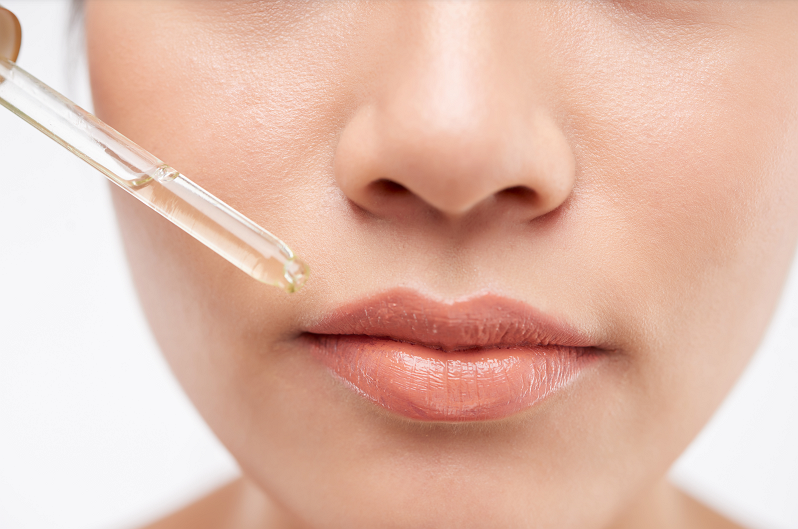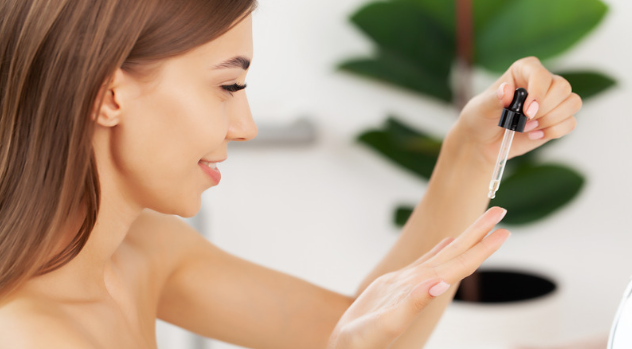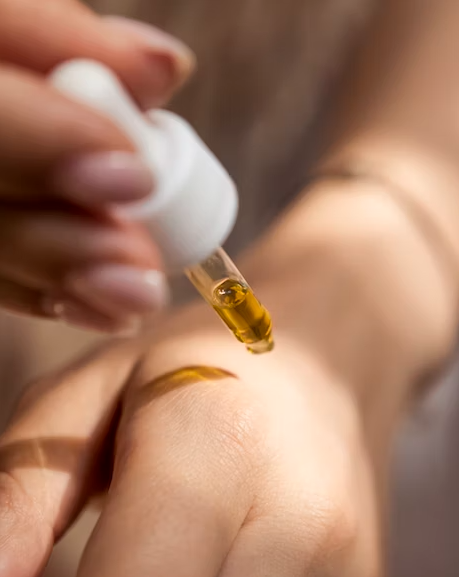Having spent countless hours searching for the perfect solution to our skin woes, I came across jojoba oil for skin, a gift from nature that promises a transformative experience for our skin. I’ve been where you are, overwhelmed with options and unsure where to turn. But with jojoba oil, I found a genuine solution, and I believe it might be the answer for you too.
Jojoba oil is a natural moisturizer that closely resembles our skin’s sebum.
The benefits of jojoba oil include hydration, balancing oil production, and promoting skin health.
If you’re grappling with skin that’s dry yet prone to breakouts, or if you’re tired of products that throw your skin’s oil balance off kilter, jojoba oil can be your sanctuary. It addresses the paradox of needing moisture without excess oil and provides the calm and balance our skin often craves.
In this article, I’ll discuss the benefits and uses of Jojoba oil for skin, so let’s start!
What Is Jojoba Oil?
Jojoba oil, derived from the seeds of the jojoba shrub native to southwestern North America, is a versatile natural substance cherished for its beneficial properties.
Its unique composition closely mirrors the sebum, or natural oil, of human skin, making it a favorite among skincare enthusiasts and professionals alike.
Individuals across the globe utilize jojoba oil for an array of applications, ranging from facial moisturizing and hair care to makeup removal and the treatment of various skin conditions.
Click here to buy jojoba oil or see the latest prices.
Benefits of Jojoba Oil For Skin

1. Natural Moisturizer
Jojoba oil serves as a natural moisturizer that can hydrate without clogging pores. Its waxy structure closely resembles the natural sebum of human skin, ensuring that it’s readily absorbed and doesn’t leave a greasy residue.
This makes it a go-to for those seeking a natural alternative to conventional moisturizers, providing deep hydration that keeps the skin looking supple and feeling soft.
2. Balances Oil Production
Unlike some oils that exacerbate oiliness, jojoba oil regulates sebum production. Since its composition mirrors our skin’s natural oils, applying jojoba can trick the skin into producing less of its own oil, leading to a balanced and less oily complexion over time.
3. Promotes Skin Health
Rich in antioxidants, vitamins E and B, and minerals like copper and zinc, jojoba oil nurtures the skin, providing essential nutrients.
These components protect the skin from environmental stressors, maintain its barrier function, and support its natural repair processes, contributing to a radiant and youthful appearance.
4. Anti-inflammatory Properties
Jojoba oil has inherent anti-inflammatory properties that can help soothe conditions like eczema and rosacea, as well as general redness or skin irritation.
Its calming effects make it a desirable ingredient for individuals with sensitive or reactive skin, offering gentle care and relief.
5. Non-comedogenic
For those prone to acne and breakouts, the term “non-comedogenic” is a relief. Jojoba oil won’t clog pores, which is crucial for preventing acne formation.
Its ability to moisturize without causing breakouts or contributing to blackheads makes it a valuable ally for both dry and oily skin types.
Click here to buy jojoba oil now.
How to Use Jojoba Oil

Facial Moisturizer
- After cleansing your face, apply a few drops of jojoba oil directly to your skin
- Gently massage in a circular motion until it’s fully absorbed
- It offers deep hydration without feeling greasy, leaving your face feeling soft and supple
Makeup Remover
- Pour a small amount of jojoba oil onto a cotton pad or your fingertips
- Gently sweep it over your face to break down makeup, even the waterproof varieties
- Follow with your regular facial cleanser to remove any residual oil or makeup
Lip Balm
- Jojoba oil can be applied directly to the lips for immediate hydration
- Just dab a small amount onto your lips whenever they feel dry or chapped
- It’ll provide a protective barrier and heal cracked lips
Cuticle Oil
- For dry or rough cuticles, apply a drop of jojoba oil to each nail bed and massage it in
- This nurtures the cuticles, promoting healthier nail growth and preventing hangnails
Body Moisturizer
- After showering or bathing, while your skin is still slightly damp, apply jojoba oil directly to your skin
- Its hydrating properties lock in moisture, leaving your skin feeling soft and smooth all-day
Skin Conditions Treatment
- For issues like eczema or psoriasis, apply jojoba oil to the affected area
- Its anti-inflammatory properties can help reduce redness and irritation
- Its moisturizing qualities soothe the dryness often associated with these conditions
Acne Treatment
- For acne-prone skin, apply a few drops of jojoba oil after cleansing
- Its non-comedogenic nature ensures pores won’t get clogged
- Its ability to balance oil production can reduce the frequency and severity of breakouts
After-Sun Care
- If you’ve spent a lot of time in the sun and your skin feels dry or irritated, jojoba oil can help
- Apply it to sun-exposed areas to soothe and moisturize the skin, helping to prevent peeling and reducing redness
Click here to buy jojoba oil now.
Potential Risk of Jojoba Oil
Jojoba oil is widely regarded as safe for most people and boasts numerous benefits for the skin, there are potential risks to be aware of:
Allergic Reactions
Although rare, some people might be allergic to jojoba oil. Symptoms of an allergic reaction could include redness, itching, swelling, or a rash.
Breakouts for Some Users
Even though jojoba oil is non-comedogenic (doesn’t clog pores) and often aids in treating acne, everyone’s skin is different. Some users have reported that it caused breakouts. It’s essential to monitor your skin’s response, especially if you are prone to acne.
Quality Matters
Some might be processed in ways that strip away their beneficial properties or might be mixed with other oils or additives that can irritate the skin. Always opt for high-quality, cold-pressed, and preferably organic jojoba oil to ensure you’re getting the best product.
Overuse
Using too much jojoba oil, or any oil for that matter, can lead to a greasy feel on the skin. This can be particularly uncomfortable in hot or humid conditions. It’s always best to start with a small amount and adjust based on your skin’s needs.
Not a Complete Solution for Severe Conditions
While jojoba oil can help alleviate symptoms of certain skin conditions like eczema or psoriasis, it’s not a cure. If you have a severe or persistent skin condition, it’s crucial to consult a dermatologist or healthcare provider for appropriate treatment options.
You can read more about using jojoba oil for wrinkles here.
Factors To Consider When Buying Jojoba Oil

When buying jojoba oil, it’s essential to consider the following aspects to ensure you get the best quality and value:
1. Purity: Ensure that the product is 100% pure jojoba oil without any added fillers, fragrances, or other oils.
2. Organic: Opt for organic jojoba oil, which ensures that the oil is free from pesticides, synthetic fertilizers, and other harmful chemicals.
3. Cold-Pressed: Cold-pressed jojoba oil retains more of its natural properties compared to those extracted using heat or chemical processes.
4. Color & Clarity: Golden jojoba oil is unrefined and has a natural tint, while clear jojoba oil is refined. Depending on your preference, you might opt for one over the other, but keep in mind that the golden variety often retains more of its natural nutrients.
5. Packaging: Dark glass bottles are preferable as they protect the oil from sunlight, which can degrade its quality.
6. Brand Reputation: Purchase from a reputable brand or supplier known for its quality and ethical sourcing practices.
7. Shelf Life: Check the expiration date to ensure you’re getting a fresh product.
8. Intended Use: Some jojoba oils might be specifically formulated or blended for certain uses, like hair care or body massage. Ensure the one you’re buying aligns with your intended use.
Related: Jojoba Oil For Eyes: Benefits And How To Use
FAQs About Jojoba Oil for Skin
Is jojoba oil actually an oil?
Despite its name, jojoba oil isn’t technically an oil but a liquid wax. Its molecular structure closely resembles the natural sebum produced by human skin.
Can I use jojoba oil daily?
Yes, many people incorporate jojoba oil into their daily skincare routine due to its hydrating and balancing properties.
Is jojoba oil good for all skin types?
Generally, jojoba oil is suitable for all skin types, including oily, dry, combination, and sensitive skin.
How should I store jojoba oil?
Store jojoba oil in a cool, dark place, away from direct sunlight. This helps maintain its beneficial properties.
Can I use jojoba oil with other skincare products?
Yes, jojoba oil can be mixed with other skincare products or act as a carrier oil for essential oils. It can also be layered under or over other skincare products, depending on personal preference.
Will jojoba oil cause breakouts?
While jojoba oil is non-comedogenic and often helps balance oil production, everyone’s skin is unique. Some people might experience breakouts, but this is relatively rare.
Is there a difference between clear and golden jojoba oil?
Yes. Clear jojoba oil has been refined and filtered, removing impurities and natural color, while golden jojoba oil retains its natural state and color. Both types have beneficial properties, but if you’re looking for a more natural product, opt for the golden variety.
Click here to buy jojoba oil now.
Summary
In conclusion, the myriad benefits of jojoba oil for the skin make it a standout ingredient in the realm of natural skincare. Its unique composition and multifaceted advantages, from hydration to balancing sebum production, position jojoba oil as a must-have for those seeking a versatile, effective, and natural solution for their skin’s needs. Whether used on its own or as a component in skincare products, the transformative potential of jojoba oil for skin is undeniable.
Discover more wonderful ways to use jojoba oil for skin wrinkles or scars as well as lips, nails, feet and hair. Also discover how to use jojoba oil as a moisturizer here or find more jojoba oil guides here.



Comments are closed.